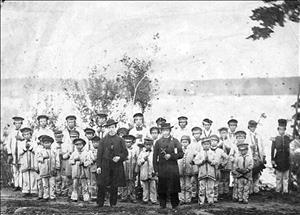At 11 a.m. on December 15, 1957, St. Anne's Mission Church at Tulalip conducts a special Mass to commemorate the centennial of the arrival of Fathers Eugene Casimir Chirouse (1821-1892) and Paul Durieu (1830-1899) to the Tulalip reservation and their establishment of St. Anne's. Participants include celebrant Rev. August Royer and Sisters from Providence Juniorate, chanters of the Mass. The sermon is given by Rev. Edmund Long, pastor of Perpetual Help Church of Everett and a former pastor of St. Mary's Parish in Marysville.
Looking Back
The Oblates of Mary Immaculate (O.M.I.) -- including Eugene Casimir Chirouse (1821-1892) -- established missions among the Walla Walla and Yakama Indians in 1847. As the hostilities that eventually led to the Yakima Indian War (1855) increased, the Oblates were recalled to Olympia for their safety and reassigned. Father Chirouse was given charge of the Puget Sound region and based at Tulalip from 1857 to 1878.
With the help of Indians at Tulalip, Father Chirouse picked a site and built a simple log structure that served as lodging for himself and Father Paul Durieu, a school, and St. Anne's Mission. Government funding of a school for Puget Sound Indians had been part of the 1855 Point Elliott Treaty promise, but when money was not given, the Missionary Oblates began their own school.
Chirouse learned the native Lushootseed language and incorporated it into services, and he compiled an English-Lushootseed dictionary. He and Father Durieu ministered throughout the region that is now Snohomish, Island, Skagit, Whatcom, and San Juan counties. The people of Tulalip were fond of Chirouse and were saddened when, in 1878, due to his advancing years, he was transferred to British Columbia. He died there in 1892.
Recovering Lost Culture
The federal government assumed control of the Indian Boarding schools in 1901, and a new school was built. But it was government policy to strongly repress native culture in all its aspects, and students were not allowed to speak their tribal language or to practice tribal customs. The government school operated until 1932. These long years of government oppression left permanent scars on Tulalip tribal members.
On May 11, 2008, for the first time in decades, Mass at St. Anne’s was spoken partially in Lushootseed. The language had been nearly lost, and the Tulalip Tribes have spent years resurrecting it. Special services incorporating Lushootseed continue at St. Anne’s, with one celebrated on Mother’s Day, May 10, 2009.

